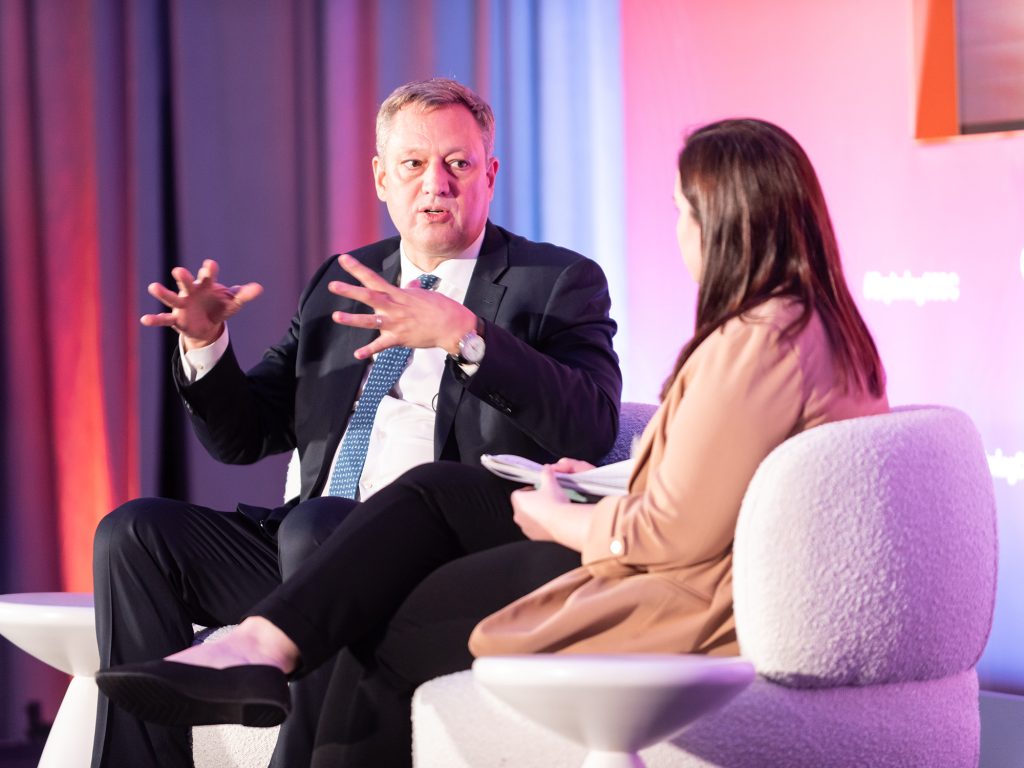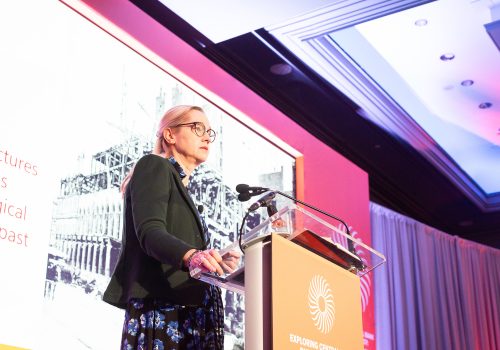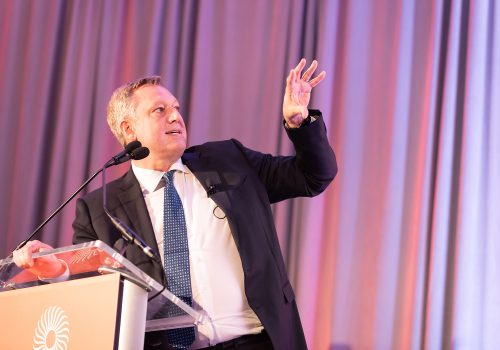Watch the full event
With the current cross-border payments system, “we could end up in a fragmented world,” warned Tobias Adrian.
To avoid that future, which would pose a variety of financial risks, the world needs a “basic set of rules and governance that is truly multilateral and inclusive,” explained Adrian, director of the Monetary and Capital Markets Department at the International Monetary Fund (IMF).
Speaking Tuesday at an Atlantic Council conference on central bank digital currencies hosted by the Council’s GeoEconomics Center, Adrian explained that the current cross-border payments system—which manages financial transactions taking place across countries’ borders—is one of the “key pillars” of the international monetary system. But, he added, the system has an array of flaws. There are shortcomings in facilitating messaging and trust between countries, swiftly moving funds, and conducting quick regulatory checks such as those regarding anti-money laundering and countering the financing of terrorism (AML/CFT), or know your customer (KYC) policies.
And with “very rapid changes” taking place in cross-border payments, Adrian warned, countries are facing “macro-critical threats,” for example possibly losing their monetary sovereignty—or their ability to control their currencies—as more cross-border payments take place outside of regular banking systems.
But there are ways to connect payment activity, Adrian explained. One such way is the IMF’s proposed XC platform, which would create a global, unified ledger for cross-border payments. The platform would not only ensure that “payments get end to end, from entity to entity,” Adrian said in conversation with Bloomberg’s Allyson Versprill. It would also essentially make the movement of money “programmable” and help ensure that countries participating in the ledger have “high bars” for AML/CFT and KYC requirements.
A world of fragmentation
- Adrian noted that while the IMF can develop a concept like the XC platform, it is really up to its 190 member countries and the private sector to “actually build such things.”
- “Our ambition would be to have platforms that are truly multilateral” to ensure that messaging is done in a “fully inclusive way” around the world, Adrian said. Thus, the IMF is looking to ensure that countries can “come together on the standards” so that every country can be “at ease to settle on the platform together.”
- “There’s really an opportunity to have a more ambitious approach to cross-border payments,” Adrian said.
- Currently, there are projects among smaller groups of countries to establish faster cross-border payments including Project mBridge (between Thailand, Hong Kong, China, and the United Arab Emirates). In response to concerns that such projects contribute to fragmentation, Adrian said that they are actually “very important” for understanding what works to make cross-border payments easier. “The global community has really benefited from seeing those projects being rolled out,” he said.
- “Still, I do hope that we can get to a more ambitious, more multilateral approach,” he said. “Given the level of geopolitical fragmentation that we have seen around the world, that is certainly difficult, but I do think there’s an opportunity to… come together.”
The IMF’s role
- The IMF and other international financial institutions are looking to harness various technologies—including encryption, programmability, and tokenization—in improving cross-border payments.
- “Technology can help,” Adrian added, “but it goes beyond technology,” to helping build trust and set up legal systems or regulations to govern the international payments system.
- Adrian explained that the IMF is also assessing countries’ AML/CFT capacities and providing technical assistance to improve that capacity and their financial integrity—and thus help support the creation of a multilateral cross-border payments system.
- The IMF is also providing technical assistance to central banks, regulators, and finance ministries globally to help countries “think through policy questions” about central bank digital currencies, Adrian explained. Currently, the IMF is working on a handbook on CBDCs that gathers shared knowledge, lessons, and findings on CBDC projects.
- These measures are part of the IMF’s “role as a guardian of the international monetary system,” Adrian added, helping countries think through trade-offs and make well-measured policy choices.
Katherine Walla is an associate director of editorial at the Atlantic Council.
Watch the full event
Further reading
Wed, Nov 29, 2023
A newly announced blockchain-backed system could transform development lending
New Atlanticist By Katherine Golden
The new project looks to put technology to work to speed up payments and make them safer, Cecilia Skingsley said at an Atlantic Council conference.
Tue, Nov 28, 2023
IMF’s Tobias Adrian on a multilateral solution to the world’s cross-border payment woes
Transcript By
Despite the geopolitical fragmentation around the world, countries can come together on a multilateral approach to the financial system, Adrian told the Atlantic Council.
Mon, Nov 6, 2023
Central bank digital currency evolution in 2023: From investigation to preparation
Econographics By Alisha Chhangani
Explore CBDC evolution in 2023, including key developments from central banks and what is next for the digital euro.
Image: Tobias Adrian of the IMF speaks at an Atlantic Council convening on central bank digital currencies on November 28, 2023.




